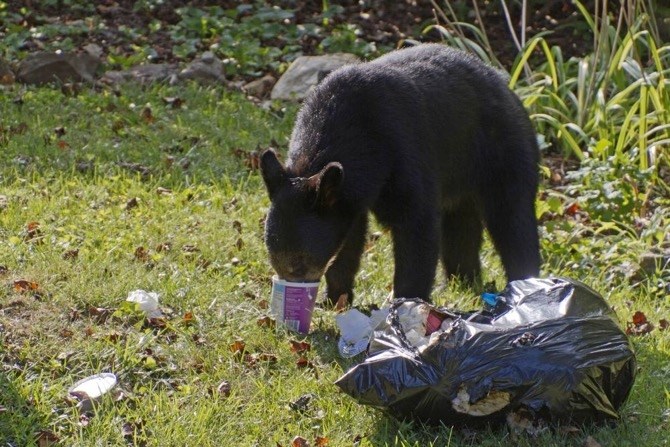
Black bear reports are up across the board in B.C. this year.
Image Credit: Shutterstock
June 24, 2019 - 6:00 AM
One man's trash is another bear's snack.
If we want to keep bears away from our trash bins, we need to keep the containers off the street overnight. But how can the late sleepers and early workers make sure their cans are put out in the morning? The answer is simple: Neighbours.
Bears love rooting through garbage cans for meals, something Terry Myroniuk, conservation officer for Kelowna, knows all too well. He said trash left outside for too long is a strong temptation for bears. Once they get a taste for human food, they can become dependent on it and routinely return to the area for more snacks, potentially becoming dangerous. This situation can have tragic outcomes, such as in Armstrong earlier this month when a bear had to be euthanized after it became addicted to unsecured garbage.
"People get sloppy with garbage," Myroniuk said. "It just takes a few people to train bears to come into neighbourhoods."
Meg Bjordal, WildSafeBC Community Coordinator, agrees that garbage is a powerful attractant for bears, which can smell food a kilometer away. In a 2018 report, she wrote that garbage was the root attractant in 71 per cent of black bear reports in the Okanagan Westside area, or 48 out of 98 cases between November 2017 and 2018.
A recent chart from WildSafeBC shows the number of black bear reports in B.C. this year have already surpassed the year-to-date numbers from 2017. There have been 5,212 black bear reports so far this year, far above the five year average of 3,610. Of these reports, 2,036 were related to food-conditioned bears.
"Ultimately, B.C. is bear country," she said. "The responsibility is on us."
That responsibility is typically noted as taking trash to the curb on collection days early in the morning instead of leaving it outside overnight. No one wants a bear in the neighbourhood, but for many people who work late or simply aren't home in the morning, getting up early to put garbage outside is a weekly struggle. Bjordal said the solution is teamwork.
In her time as a community coordinator, Bjordal said the neighbourhoods that experience the fewest bear sightings are the ones that work together. People keep their garbage locked up before collection day, but it's more than that. Bjordal said these neighbours help each other out by taking garbage to the curb if someone isn't there to do it themselves, or at least storing it in a secure place.
"It's about working together," she said.
For people who can't coordinate with their neighbours, Bjordal recommends taking trash to waste transfer sites personally.
Myroniuk said it's frustrating to hear constant reports of bears breaking into garbage cans. He's hopefully people can plan ahead to keep bears in forests and away from neighbourhoods.
"We've got to break the cycle," he said. "It's on us."
To contact a reporter for this story, email Sean Mott or call (250) 864-7494 or email the editor. You can also submit photos, videos or news tips to the newsroom and be entered to win a monthly prize draw.
We welcome your comments and opinions on our stories but play nice. We won't censor or delete comments unless they contain off-topic statements or links, unnecessary vulgarity, false facts, spam or obviously fake profiles. If you have any concerns about what you see in comments, email the editor in the link above.
News from © iNFOnews, 2019